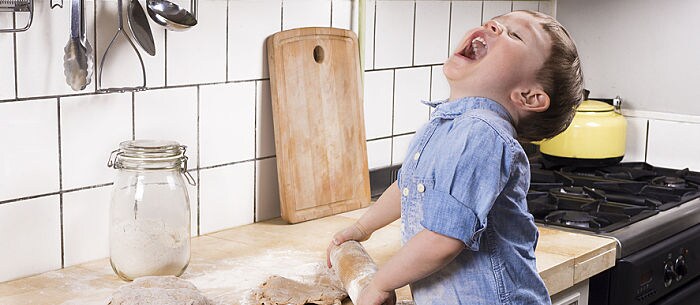Is your child in what’s called the “terrible twos” or is she just a typical toddler? Who says the twos have to be terrible? And when do they start (or if you’re in the middle of it, you might want to know when it will end!)? Even if you think you’ve made it through the twos unscathed, this phase of development can suddenly hit at 3, so watch out! Here’s a guide to understanding why toddlers go through this trying period of asserting themselves and testing your patience.
When Do the Terrible Twos Start and End?
“This phase begins and ends at different times for different kids,” says Bette Alkazian, a licensed marriage and family therapist with Balanced Parenting. “Some start this phase at 18 months, some right at 2 and some don’t get started until 3 and a half.” But no matter when the terrible twos happen, the important thing is to just embrace them.
“There’s not much that parents can do to stop the terrible twos from happening,” says Dr. Claire McCarthy, a pediatrician at Boston Children’s Hospital and assistant professor of pediatrics at Harvard Medical School, adding, “Don’t take it personally or think that it has any particular future implications.” Instead, arm yourself with information about this phase. Try to relax and go with it.
Here are some signs of toddlers who are in the terrible twos:
- Their Frustration Levels Are Growing
They are trying to do more things on their own, but they often can’t accomplish these tasks right away. So they get agitated — and so do you! They are testing out the limits of their new found Independence. As Alkazian puts it, “This little bean finally has some control over his physical world, after years of trying to figure it all out. It’s really a figuring-things-out kind of phase.”
- They Don’t Back Down
They have their own ideas in their head and don’t back down easily when their ideas clash with yours. That adventurous, stubborn spirit that 2-year-olds are known for can be trying for parents, but as McCarthy says, “It’s really not about terrible — it’s about burgeoning independence and abilities. Starting at around 18 months, children begin to want to assert that independence and make their own decisions, but don’t quite understand the concepts of rules or social norms.”
- They Test Limits
Why do 2-year-olds always seem to be testing your patience? “This is the age when little ones have finally started to master some of their physical worlds, and are testing out the limits of their little lives, often with parents,” Alkazian explains. “When mom and dad have a strong reaction to them getting into something, they have to try it again to see what you’ll do.”
- They Do Things Repetitively
They try everything once, and when they find something they like, they want to do it over and over. Any parent of a 2-year-old knows how annoying it can be to read the same story, in the same funny voice over and over again. Why do 2-year-olds need so much repetition? “It’s how they learn — through repetition,” Alkazian notes. “It’s how they figure things out.” So get used to saying, “Hands off the dog!” over and over until your 2-year-old sees a pattern or moves onto something else she loves just as much.
- Their Minds Haven’t Caught Up to Their Bodies
Two-year-olds are adventurous — physically they can do more, but don’t know their limits yet. “They are a danger to themselves,” Alkazian cautions. “They don’t yet have the cognitive ability to see what’s around the corner, but physically they are curious.” It is up to parents to show them what is safe and what isn’t. Warning — you might be taking something new and fun away from them!
- Their Bodies Haven’t Caught Up to Their Minds
Their minds and bodies are both growing at increasing rates, and that means they are trying to soak everything in. “This is a time of rapid growth physically and that can affect behaviors,” says Alkazian. “They might be getting their molars in, catching colds all the time and tiring themselves out.” This is a time of rapid development and growth, which translates into a topsy-turvy phase for parents.
Both Alkazian and McCarthy encourage parents to read books and articles on what is typical 2-year-old behavior to know what to expect during this challenging time. For more information, read 2-Year-Old Milestones for Physical Development.
Amy Aitman is a freelance writer and mommy blogger. She loves writing about parenting and looks back to the terrible twos with fondness now that her she has a “fournager” (four-year-old)!




